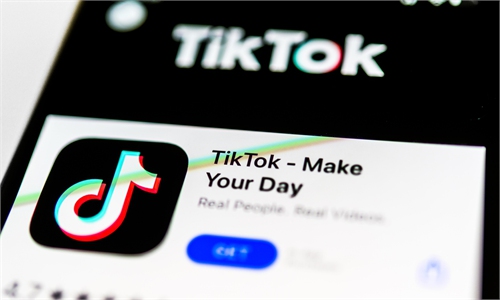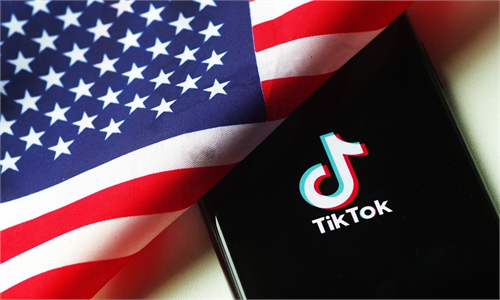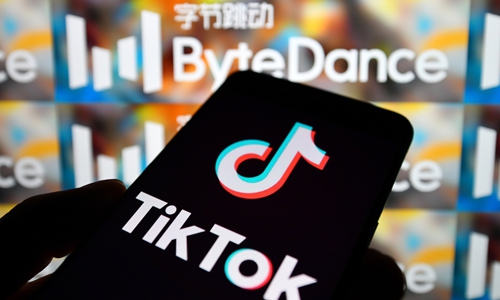Tech agreement shows China-US entanglement no longer easy

Illustration: Liu Rui/GT
US President Donald Trump said Saturday that he had approved "in concept" a deal in which Oracle and Walmart would partner with TikTok in the US. This means his previous suppression of TikTok has failed. It also means that after Huawei, another Chinese company going global has wisely been able to resolve US hegemonic suppression.
The colossal competition between China and the US has shown features that do not exist in traditional struggles between major powers. The US is very wary of the investment and use of Huawei, TikTok and WeChat. Some US politicians have even proposed China-US decoupling. The current reality is that decoupling is not easy. US politicians' attempts may not be able to defeat marketization and globalization.
Previously, teenage users of TikTok in the US strongly opposed the app's ban in the country. Finally, Trump compromised. TikTok still retains most of the equity and control of the core algorithm, which is far from the US administration's goal of forcing TikTok to sell itself to its rivals such as Facebook or Microsoft.
The same is true for Huawei. Over the past two years, the average annual growth rate of Huawei's mobile phone sales worldwide has exceeded 20 percent. China's outstanding international companies are merging with globalization. And the US has simply no power to stop it.
Although the road ahead is still difficult, TikTok's survival and development in the US market has once again shown US politicians are bluffing over the country's purported power.
Trump prides himself on winning the TikTok agreement. But in fact, the survival and development of Huawei and TikTok, under the suppression of the world's only superpower, is the biggest reflection of the weakness of the US power and the resilience of Chinese companies.
I have investigated dozens of Chinese companies engaging in foreign trade. None of them has died in the US-initiated trade and technology war against China. On the contrary, many have become braver and more mature. Chinese companies are learning to make full use of the legal and market means to deal with US hegemony.
An important background, of course, is China's tactful response to the US. China unveiled "unreliable entities list" rules and imposed sanctions on anti-China US officials following the US provocative actions. The US should have considered the possibility of a pragmatic response from China before it decided to act aggressively against it.
In other words, if the US wants China to feel the pain, it must feel the pain itself.
Chinese people are not arrogant, nor do they seek global political and security dominance as the US does. Defeating the US has never been China's goal. On the contrary, China's pragmatic aspiration is to cooperate with the US as much as possible to promote its own development.
This can be regarded as a new process of a civilized "great power" game. This great power competition in the 21st century is not necessarily a zero-sum game in which "you" win and "I" lose. It is more likely to be a long-term business in which "you" earn more and "I" earn less.
The Chinese, of course, have a bottom-line mentality and are prepared for the worst-case scenario. In recent years, some voices in China have been worried about the possibility of a cold war or even a hot war between China and the US.
In my opinion, in the next decade or more, the frictions between China and the US will be normalized. The game is most likely to be an entanglement rather than a one-sided battle or a violent confrontation.
It is neither necessary for the international community to take sides nor be surprised when they adapt to the new normal as both struggle and cooperation between China and the US play out over a longer period of time. Washington now should dispel all illusions that it can crush Beijing. It cannot defeat even a Chinese company, let alone China the country.
For China, we need to view the US in a more realistic light too.
The US is no longer the beautiful country as its name in Chinese, 美国 (meiguo), suggests. And Chinese people need not worship or fear the US. Nor hate or oppose it. The US is not China's enemy. Nor is it China's friend as we had expected it to be. If Chinese companies can operate in accordance with laws and market rules, they will surely go further and better.
The author is professor and executive dean of the Chongyang Institute for Financial Studies at Renmin University of China, and executive director of China-US People-to-People Exchange Research Center. wangwen2013@ruc.edu.cn




